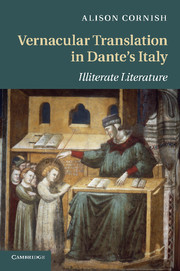Book contents
- Frontmatter
- Contents
- Acknowledgements
- Introduction
- 1 Dressing down the muses: the anxiety of volgarizzamento
- 2 The authorship of readers
- 3 Cultural ricochet: French to Italian and back again
- 4 Translation as miracle: illiterate learning and religious translation
- 5 The treasure of the translator: Dante and Brunetto
- 6 A new life for translation: volgarizzamento after humanism
- Notes
- Bibliography
- Index
- CAMBRIDGE STUDIES IN MEDIEVAL LITERATURE
5 - The treasure of the translator: Dante and Brunetto
Published online by Cambridge University Press: 04 February 2011
- Frontmatter
- Contents
- Acknowledgements
- Introduction
- 1 Dressing down the muses: the anxiety of volgarizzamento
- 2 The authorship of readers
- 3 Cultural ricochet: French to Italian and back again
- 4 Translation as miracle: illiterate learning and religious translation
- 5 The treasure of the translator: Dante and Brunetto
- 6 A new life for translation: volgarizzamento after humanism
- Notes
- Bibliography
- Index
- CAMBRIDGE STUDIES IN MEDIEVAL LITERATURE
Summary
In a treatise entitled ‘Fruits of the Tongue’, which grows out of what he admits is almost entirely a translation taken from ‘Guglielmo di Frencia’ (William Peraldus, Summa de vitiis), Domenico Cavalca describes preachers who want only to show off to educated audiences as ‘adulterers of the word’:
And if they do preach, they do not want to preach except to a great people, and to honourable and literate persons, to show off their knowledge more than to teach the way of God. These, as St Paul says, are adulterers of the word of God in that, as Saint Gregory says, they do not scatter the seed of the word of God to engender spiritual sons of God, but to have temporal glory or gain for themselves.
These show-off preachers are also described as those ‘great literary men without conscience’ who are the ‘worst men in the world’ (‘gli peggiori uomini del mondo sono li grandi letterati senza coscienza’). Although it is important for men to have sufficient knowledge in order to teach others, Cavalca reminds his reader that Augustine says that many saints were perfect in the desert, however unlearned (‘quantunque idioti’). The enterprise of vernacularization, of which the Frutti are a part, is for the benefit of the unlearned, as Cavalca often repeats: ‘I as a simple person speak in the vernacular to simple and unlearned men’ (‘io come semplice parlo in volgare per uomini semplici ed idioti’).
- Type
- Chapter
- Information
- Vernacular Translation in Dante's ItalyIlliterate Literature, pp. 126 - 157Publisher: Cambridge University PressPrint publication year: 2010



